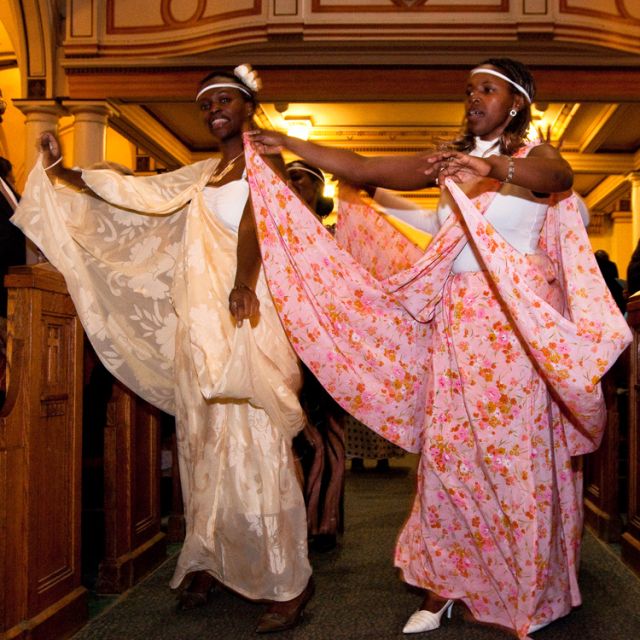"We are called to bring out the very light of God in our lives," he said.
Victor Munya is eager tost share the story of the Kibeho apparitions. Munya is from Kibeho and remembers huge gatherings of people when Mary, referring to herself as "the mother of the Word," appeared in the high school sports field.
Munya survived the 1994 Rwandan genocide by bringing his family and about 250 others to the Hotel des Mille Collines. The story of more than 1,200 genocide survivors at the hotel was made into the 2004 film Hotel Rwanda.
"We have this message to teach everybody — this rosary," said Munya, who now lives in Toronto and is a minister of communion at his parish.
Among the messages from a series of apparitions at Kibeho, Our Lady urged people to pray the rosary commemorating the seven sorrows of Mary. She also urged songs and dancing in the African tradition.
One apparition appeared to warn of the coming genocide. The genocide which confirms the importance of Our Lady's message of love, conversion and reconciliation, said Munya.

Jesuit Father William Mbugua urged the 300 gathered for the mass to learn from the past, "We are not just victims of our history. We have to ask, what is it that God has given us, even in the midst of suffering?"
Photo by Michael Swan
Black History Month is a very big deal at St. Aloysius Gonzaga Secondary School in Mississauga, just west of Toronto, said English teacher Cathy Coelho. Along with staff and students at Gonzaga, Coelho has organized the Dufferin-Peel Catholic District School Board's eighth annual Black History Month conference. Landing during the same month Dufferin-Peel Catholic schools are promoting the virtue of respect, Black History Month is important for "those who see themselves as part of black culture and for the whole school community," said Coelho.
"There is this multicultural perspective that we're really lucky to get," said Coelho.
About 35 per cent of Gonzaga's 1,800 students are non-white, though more are Asian than black. The school has a sizable population of students whose families come from Ghana, but there are also West Indian students and black Canadians who can trace their family history in Canada back generations.
The diversity of black history dovetails with the diversity of the school, said Coelho. It's also why Black History Month is so important for a Catholic school.
"The great thing about Catholicism is that it's an incredibly diverse faith and it is the faith of the people," she said. "People from all different walks of life and all different backgrounds are part of it. "
The month dedicated to black experience around the world teaches students how to embrace a subtler, richer and more diverse understanding of history.
"There are many stories involved in telling the story (of black history)," said the teacher.
The conference runs Feb. 17 from 9:15 a.m. to 1:45 p.m. at St. Aloysius Gonzaga, 2800 Erin Centre Blvd. in Mississauga. It features a range of speakers from Gospel singer Diane Clemens to cardiac surgeon Dr. Marc Davis, social workers Patricia Codner and Nadia Kerr and musician Kibwe Thomas.
It's an opportunity for black youth to come into contact with significant role models, said Coelho.
In the classroom, students will encounter their history in a different way, she said.
"There is this feeling of disempowerment and of embarrassment when your history was only ever addressed in terms of being the conquered," she said. "This conference is fabulous because it shows people — all from the GTA, we're not importing people — these people who are local and can be looked at as role models."

